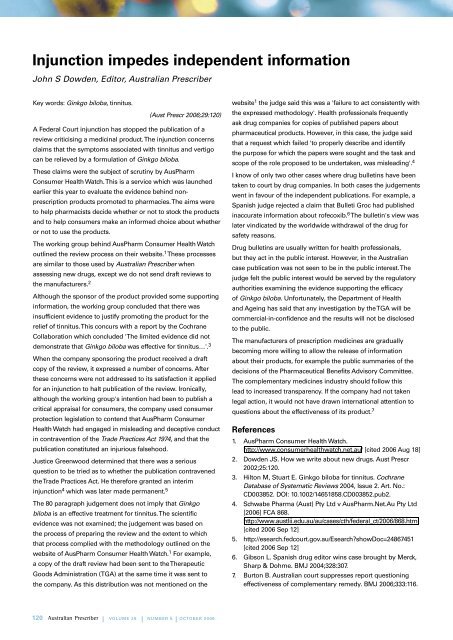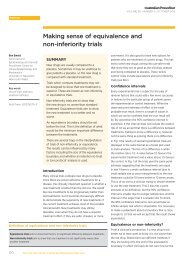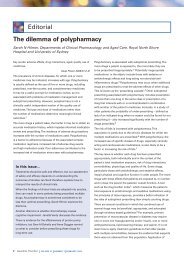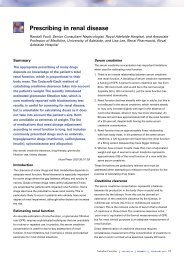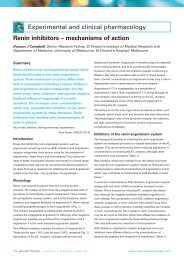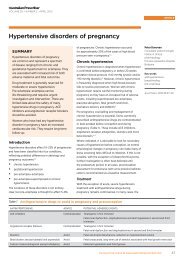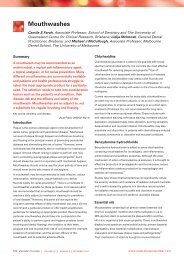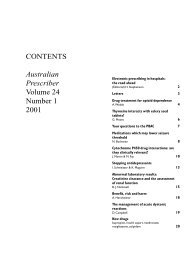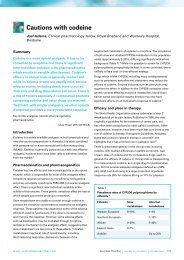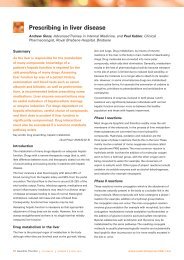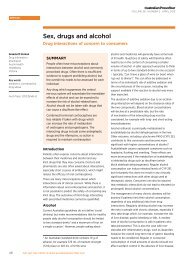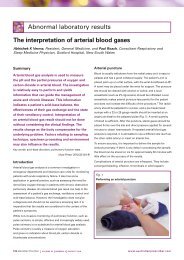download the full PDF issue - Australian Prescriber
download the full PDF issue - Australian Prescriber
download the full PDF issue - Australian Prescriber
You also want an ePaper? Increase the reach of your titles
YUMPU automatically turns print PDFs into web optimized ePapers that Google loves.
Injunction impedes independent information<br />
John S Dowden, Editor, <strong>Australian</strong> <strong>Prescriber</strong><br />
Key words: Ginkgo biloba, tinnitus.<br />
(Aust Prescr 2006;29:120)<br />
A Federal Court injunction has stopped <strong>the</strong> publication of a<br />
review criticising a medicinal product. The injunction concerns<br />
claims that <strong>the</strong> symptoms associated with tinnitus and vertigo<br />
can be relieved by a formulation of Ginkgo biloba.<br />
These claims were <strong>the</strong> subject of scrutiny by AusPharm<br />
Consumer Health Watch. This is a service which was launched<br />
earlier this year to evaluate <strong>the</strong> evidence behind nonprescription<br />
products promoted to pharmacies. The aims were<br />
to help pharmacists decide whe<strong>the</strong>r or not to stock <strong>the</strong> products<br />
and to help consumers make an informed choice about whe<strong>the</strong>r<br />
or not to use <strong>the</strong> products.<br />
The working group behind AusPharm Consumer Health Watch<br />
outlined <strong>the</strong> review process on <strong>the</strong>ir website. 1 These processes<br />
are similar to those used by <strong>Australian</strong> <strong>Prescriber</strong> when<br />
assessing new drugs, except we do not send draft reviews to<br />
<strong>the</strong> manufacturers. 2<br />
Although <strong>the</strong> sponsor of <strong>the</strong> product provided some supporting<br />
information, <strong>the</strong> working group concluded that <strong>the</strong>re was<br />
insufficient evidence to justify promoting <strong>the</strong> product for <strong>the</strong><br />
relief of tinnitus. This concurs with a report by <strong>the</strong> Cochrane<br />
Collaboration which concluded 'The limited evidence did not<br />
demonstrate that Ginkgo biloba was effective for tinnitus…'. 3<br />
When <strong>the</strong> company sponsoring <strong>the</strong> product received a draft<br />
copy of <strong>the</strong> review, it expressed a number of concerns. After<br />
<strong>the</strong>se concerns were not addressed to its satisfaction it applied<br />
for an injunction to halt publication of <strong>the</strong> review. Ironically,<br />
although <strong>the</strong> working group's intention had been to publish a<br />
critical appraisal for consumers, <strong>the</strong> company used consumer<br />
protection legislation to contend that AusPharm Consumer<br />
Health Watch had engaged in misleading and deceptive conduct<br />
in contravention of <strong>the</strong> Trade Practices Act 1974, and that <strong>the</strong><br />
publication constituted an injurious falsehood.<br />
Justice Greenwood determined that <strong>the</strong>re was a serious<br />
question to be tried as to whe<strong>the</strong>r <strong>the</strong> publication contravened<br />
<strong>the</strong> Trade Practices Act. He <strong>the</strong>refore granted an interim<br />
injunction 4 which was later made permanent. 5<br />
The 80 paragraph judgement does not imply that Ginkgo<br />
biloba is an effective treatment for tinnitus. The scientific<br />
evidence was not examined; <strong>the</strong> judgement was based on<br />
<strong>the</strong> process of preparing <strong>the</strong> review and <strong>the</strong> extent to which<br />
that process complied with <strong>the</strong> methodology outlined on <strong>the</strong><br />
website of AusPharm Consumer Health Watch. 1 For example,<br />
a copy of <strong>the</strong> draft review had been sent to <strong>the</strong> Therapeutic<br />
Goods Administration (TGA) at <strong>the</strong> same time it was sent to<br />
<strong>the</strong> company. As this distribution was not mentioned on <strong>the</strong><br />
120 | VOLUME 29 | NUMBER 5 | OCTOBER 2006<br />
website1 <strong>the</strong> judge said this was a 'failure to act consistently with<br />
<strong>the</strong> expressed methodology'. Health professionals frequently<br />
ask drug companies for copies of published papers about<br />
pharmaceutical products. However, in this case, <strong>the</strong> judge said<br />
that a request which failed 'to properly describe and identify<br />
<strong>the</strong> purpose for which <strong>the</strong> papers were sought and <strong>the</strong> task and<br />
scope of <strong>the</strong> role proposed to be undertaken, was misleading'. 4<br />
I know of only two o<strong>the</strong>r cases where drug bulletins have been<br />
taken to court by drug companies. In both cases <strong>the</strong> judgements<br />
went in favour of <strong>the</strong> independent publications. For example, a<br />
Spanish judge rejected a claim that Bulleti Groc had published<br />
inaccurate information about rofecoxib. 6 The bulletin's view was<br />
later vindicated by <strong>the</strong> worldwide withdrawal of <strong>the</strong> drug for<br />
safety reasons.<br />
Drug bulletins are usually written for health professionals,<br />
but <strong>the</strong>y act in <strong>the</strong> public interest. However, in <strong>the</strong> <strong>Australian</strong><br />
case publication was not seen to be in <strong>the</strong> public interest. The<br />
judge felt <strong>the</strong> public interest would be served by <strong>the</strong> regulatory<br />
authorities examining <strong>the</strong> evidence supporting <strong>the</strong> efficacy<br />
of Ginkgo biloba. Unfortunately, <strong>the</strong> Department of Health<br />
and Ageing has said that any investigation by <strong>the</strong> TGA will be<br />
commercial-in-confidence and <strong>the</strong> results will not be disclosed<br />
to <strong>the</strong> public.<br />
The manufacturers of prescription medicines are gradually<br />
becoming more willing to allow <strong>the</strong> release of information<br />
about <strong>the</strong>ir products, for example <strong>the</strong> public summaries of <strong>the</strong><br />
decisions of <strong>the</strong> Pharmaceutical Benefits Advisory Committee.<br />
The complementary medicines industry should follow this<br />
lead to increased transparency. If <strong>the</strong> company had not taken<br />
legal action, it would not have drawn international attention to<br />
questions about <strong>the</strong> effectiveness of its product. 7<br />
References<br />
1. AusPharm Consumer Health Watch.<br />
http://www.consumerhealthwatch.net.au/ [cited 2006 Aug 18]<br />
2. Dowden JS. How we write about new drugs. Aust Prescr<br />
2002;25:120.<br />
3. Hilton M, Stuart E. Ginkgo biloba for tinnitus. Cochrane<br />
Database of Systematic Reviews 2004, Issue 2. Art. No.:<br />
CD003852. DOI: 10.1002/14651858.CD003852.pub2.<br />
4. Schwabe Pharma (Aust) Pty Ltd v AusPharm.Net.Au Pty Ltd<br />
[2006] FCA 868.<br />
http://www.austlii.edu.au/au/cases/cth/federal_ct/2006/868.html<br />
[cited 2006 Sep 12]<br />
5. http://esearch.fedcourt.gov.au/Esearch?showDoc=24867451<br />
[cited 2006 Sep 12]<br />
6. Gibson L. Spanish drug editor wins case brought by Merck,<br />
Sharp & Dohme. BMJ 2004;328:307.<br />
7. Burton B. <strong>Australian</strong> court suppresses report questioning<br />
effectiveness of complementary remedy. BMJ 2006;333:116.


